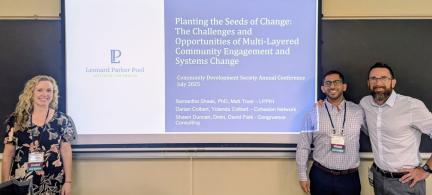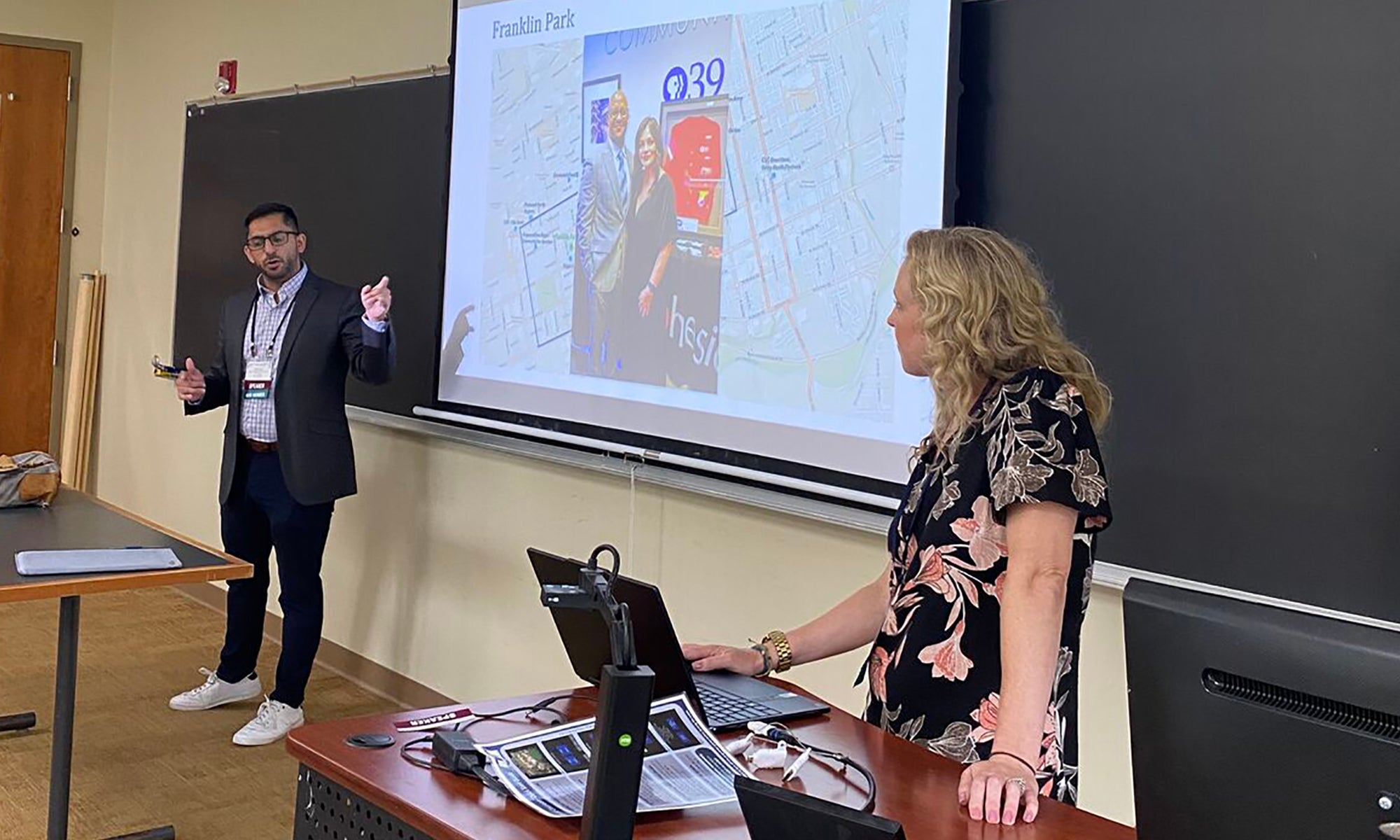
7 Thoughts From the Community Development Society Conference
Third in a series of reflections from the LPPIH
In July 2025, Samantha Shaak, Executive Director at the Leonard Parker Pool Institute for Health (LPPIH), attended the Community Development (CD) Society Conference in Geneva, N.Y., accompanied by Matt Trust, Community Engagement and Communications Specialist at LPPIH, and Shawn Duncan, Executive Director at Congruence Consulting, based in Atlanta, Ga. The three participated and presented a joint session highlighting the neighborhood engagement work within Franklin Park. The presentation demonstrated what it looks like to layer an institution like LPPIH with local nonprofits and national partners to build neighborhood momentum.
The CD Society aims to strengthen and advance community development policy, practice, learning and research through educational and scientific means. Its annual conference is a place for those immersed in community engagement to share their best practices. Beyond the presentation, the event brought together voices from around the globe, from Vermont to Japan. While the contexts varied, common themes of leadership, trust, creativity and resilience stood out.

Insights from around the country and the world
1. Place as classroom
Philadelphia’s STRIPES program at Belmont Charter School embodied the idea that “the community is our classroom.” By rooting learning in real neighborhoods and issues, students gained not only knowledge but a sense of belonging and purpose. Place-based learning emerged as a powerful way to prepare the next generation for civic life.
2. Leadership takes time, labor and reflection
The University of Minnesota’s redesign of its Bridging Cohorts, which provides an opportunity to join colleagues with similar interests and delve deeper within a supportive community of their peers, reminded attendees that developing community leaders requires more than curriculum. It takes deliberate time to build relationships, process experiences and reflect. Leadership development done well is labor-intensive but critical for long-term impact.
3. Trust is built in the follow-through
The panel representing Geneva 2030, which brings together community members to work on key goals surrounding kindergarten readiness, literacy success, STEAM success, graduation rate improvement and advancing college and career readiness, reinforced that trust depends on consistency. Pediatricians, librarians and tutors alike stressed that promises without follow-through do more harm than good, and unchecked assumptions erode credibility. True civic muscle grows when listening leads directly to action.
4. Magnets, not walls
David Kay, Senior Extension Associate, Cornell University, reframed community development as creating “magnets, not walls.” Rather than focusing on population decline, communities should invest in reasons for young people to stay or return – whether through education, health partnerships or career pathways. Pulling people in with opportunity is more powerful than resisting their leaving.
5. Culture as capacity
The Division Midway Alliance, a nonprofit organization dedicated to revitalizing the commercial corridor and improving livability for those living and working on and around SE Division between 117th and 148th avenues in Portland, Ore., showed that culturally specific liaison models – led by people who share language and lived experience – become engines of community capacity. From entrepreneurship classes to youth mural projects, their success affirmed that honoring cultural context is essential for lasting engagement.
6. Dashboards can raise civic IQ
In Bulloch County, Georgia, the BEACON initiative – an interactive online dashboard designed to provide transparent data on key community areas like education, health, safety and the economy – helps guide decision-making. The dashboard itself was important, but the process of community conversations mattered even more; framing shared priorities and elevating civic literacy. Its guiding question, “How do we raise civic IQ?,” underscored the dashboard’s role as a tool for dialogue, not just data.
7. New nations, new councils
Sint Maarten, a constituent country of the Kingdom of the Netherlands located in the Caribbean and only 15 years into its autonomous country status, is still navigating the basics of governance. A fellow presenter described how its Community Council Empowerment Pilot Project uses training and NGO development to build civic infrastructure from the ground up. Even where democratic traditions are fragile, structured community councils can lay a foundation for collective action.
Looking ahead
As we returned from the conference, what stood out most is how much these lessons echo the work happening in Franklin Park and across the Lehigh Valley. Whether it’s nurturing local leadership, building trust through action, or creating “magnets” that invite people to stay rooted in their communities, these ideas are not just theory: they are blueprints for what’s possible. The conversations we joined remind us that community development is never finished; it is a practice of listening, learning and adapting together. At LPPIH, we’re excited to carry these insights forward, deepen our partnerships and continue weaving local wisdom with broader perspectives.
